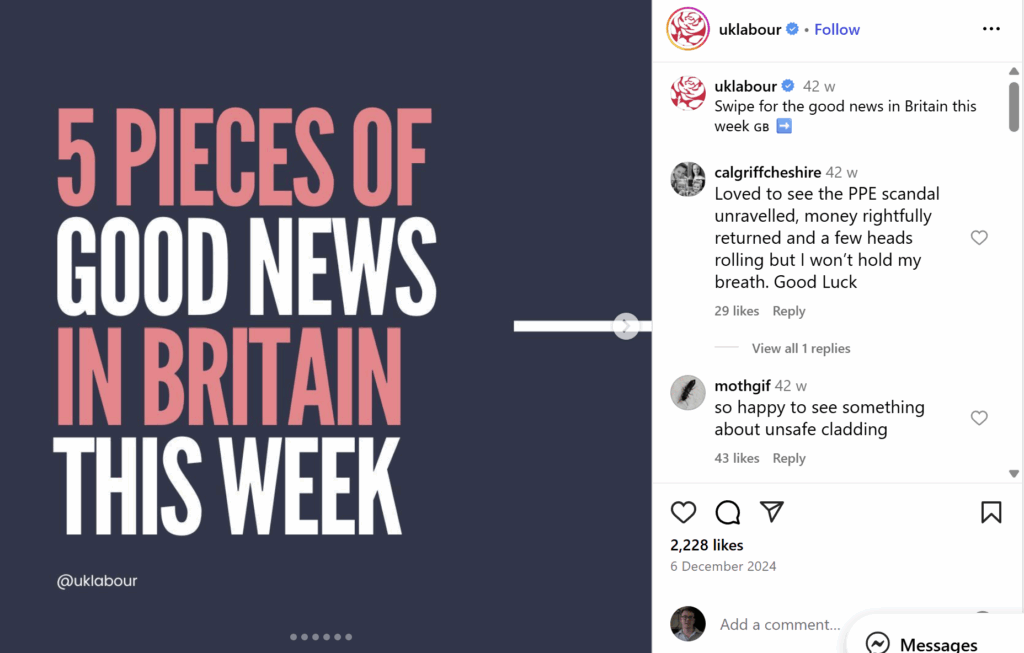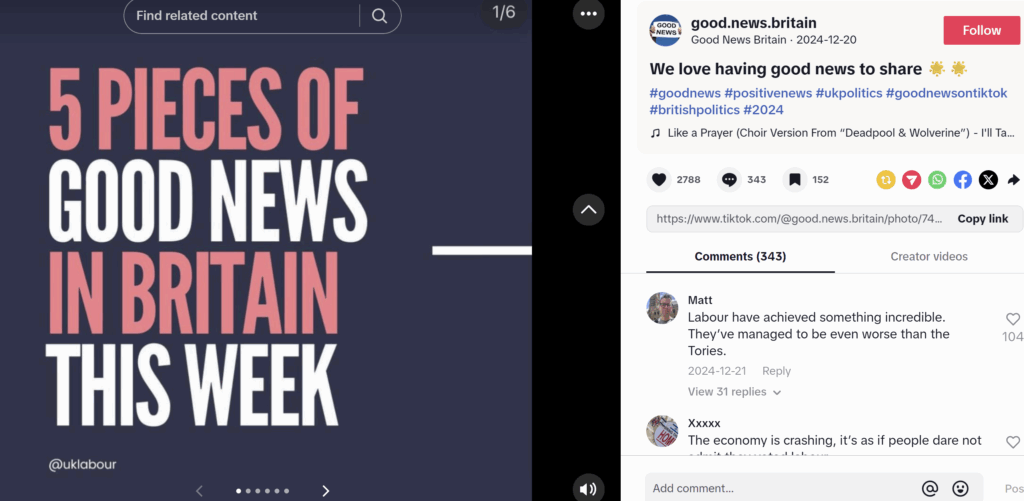Journalists secretly offered cash for social media posts
Earlier this summer, a journalist named Amun Bains received an unusual message on TikTok.
It was from an account named Good News Britain, which said it was working with a group called The Amplifiers to build “a network of digital producers countering the far right online”.
Bains was told The Amplifiers wanted to “work with producers whose progressive content can cut through the noise and counter the division and disinformation spread by the far right”.
He would be paid £50 a week to post at least five “progressive” videos on his social media accounts, with the potential for bonuses.
Was this something that he would be interested in?
Bains gave his email address to Good News Britain, and was contacted by The Amplifiers shortly after to arrange a call.
But after the call, Bains realised that The Amplifiers was being run by a little-known digital communications agency named 411.
He was even more concerned to learn that Assaf Kaplan, a former Israeli intelligence officer in Unit 8200, had been on the call with him as one of the company’s directors.
But who is paying 411, and why?
411 was set up last September by former Labour party officers who describe themselves as “the team behind the… historic 2024 general election victory”. It is named after the number of seats won by Keir Starmer’s party.
Documents obtained by Declassified indicate how 411 is recruiting journalists and influencers to publish content which attacks Reform UK and promotes Labour’s political objectives.
411 doesn’t want the public to know who is sponsoring the content, and asks participants to sign non-disclosure agreements before joining The Amplifiers.
The information raises concerns about how a Labour-linked digital communications firm might be attempting to shape the opinions of the British public without its knowledge or consent.
411 claims the work is not connected to the Labour party, but refused to say who was funding The Amplifiers project and for what purpose.
A Labour party spokesperson told Declassified: “We do not comment on confidential arrangements with any contractor”.
Paul Holden, journalist and author of The Fraud, told Declassified: “These sorts of paid-for influencer campaigns are both silly and self-defeating.
“When they are inevitably uncovered, they undermine the public’s trust and make people more responsive to the overtures of the likes of Farage. You can’t fight misinformation with astroturf campaigns. It’s stupid to even try”.
Flooding the internet
During their call, Kaplan and 411’s senior manager Caitlin Otway promised to send Bains a “Statement of Work” to outline future collaboration with The Amplifiers.
But the 411 team accidentally sent Bains their onboarding script for new recruits.
“We’re so excited that you’re interested in joining our new network of content creators”, it said.
“Our overarching aim is to flood the internet with smart, engaging, progressive short-form content”, it added.
The script continued by explaining what the work would involve, with The Amplifiers sending a weekly brief to influencers about what topics to focus on.
The brief would involve “suggested narratives to lean into; a key moment from the news; a short article or clip to work from; or just a tone or theme to explore”, Bains was told.
Those themes might include: “Nigel Farage is not on your side, Immigration, improvements to the NHS etc”, all of which would appear to be beneficial to the Labour party.
The journalists would receive £50 per week for producing a minimum of five videos, “but we will also be rewarding standout contributions once you’ve been onboard for a while”.
As the project grows, the script added, high-performing creators would “have opportunities for expanded roles and higher rates in future phases”.
Shortly after, Bains was sent the correct Statement of Work document, which highlighted the importance of confidentiality.
“The Freelancer agrees to maintain the confidentiality of any sensitive information shared by 411 as per the NDA [Non-Disclosure Agreement] Contractor Agreement”, the document noted.
“All work created under this agreement will be the intellectual property of 411 unless otherwise agreed in writing”, it continued.
Bains was also sent the NDA, which included instructions to destroy any confidential information associated with The Amplifiers “on demand”.
One 411 staffer added a comment to an internal document seen by Declassified, asking: “Do we want to specify anywhere that we want the content to be faceless?”
‘Shaping narratives’
Comments like that might suggest 411 does not want the public to know it is behind a growing amount of political content being published on social media.
This could be because the company has extensive links with the Labour party, even if it claims The Amplifiers project operates independently.
Its strategic director Caitlin Chalmers was Labour’s Digital Advertising Manager between 2022 and 2024 while Kaplan was recruited as the party’s Social Listening and Organising Manager in January 2021.
Kaplan is a former member of Israel’s Unit 8200, the controversial spyware branch of the IDF which has been involved in unlawful surveillance and blackmail operations against Palestinians.
According to Kaplan’s LinkedIn page, which was discovered by Electronic Intifada but has since been deleted, he was in the Israeli army’s military intelligence division from May 2009 to November 2013.
Declassified has identified five other 411 staffers who have recently or are currently working for the Labour party.
One of them described her 411 role as “shaping narratives; amplifying voices, and powering campaigns for MPs, Labour-affiliated groups, political parties, and causes that matter”.
Another works with 411 on “planning and designing email campaigns and strategies for Labour MPs across the UK to help them communicate effectively with their constituents”.
Bains told Declassified: “As an independent journalist who creates work for the public, I was irritated to find out that other ‘independent creators’ were actually working for The Amplifiers and not disclosing it”.
He added: “I rationalised that Kaplan in the past may have been complicit in the horrors of what is happening in Palestine after reading the Electronic Intifada article which revealed his past in unit 8200, but I was also genuinely scared that I had just told this ex-intelligence officer details about myself”.
Promoting Labour values
Even if The Amplifiers project was not conceived by the Labour party, they could stand to benefit from its activities, as both are focused on attacking Reform UK.
Good News Britain, the TikTok account which first contacted Bains about joining the project, publishes content which is remarkably similar to the Labour party’s own social media posts.
Indeed, Good News Britain’s first ever post was lifted directly from the Labour party’s official Instagram account, entitled “5 Pieces of Good News in Britain This Week”.


Good News Britain’s other posts have been effusive in their praise of Starmer and the Labour government’s policies.
One of those posts, entitled “3 reasons to feel proud to be British this week”, declares how “we have a leader [Starmer] who acts with kindness and dignity on the world stage”.
Good News Britain was approached for comment.
Bains’ instructions from The Amplifiers also appear to be in line with the Labour party’s own political objectives.
A briefing document from The Amplifiers, and seen by Declassified, instructs influencers to create social media posts about how “Nigel Farage does not stand for the working class”.
Suggested points to cover include how “all Reform UK MPs voted against the Employment Rights Bill” which was introduced to parliament by the Labour government last year.
In bold writing, the briefing notes: “The main message we want to get across is Nigel Farage does not represent the working class, so feel free to interpret this in your own way!”
Around the same time that Bains was sent the briefing document, the Labour party’s official TikTok page ran a series of posts attacking Farage and his record on workers’ rights.
When Bains asked 411 who was paying for The Amplifiers project, the company’s directors suggested it was funded by 411 alone.
He was told: “The Amplifiers is a pilot project funded and coordinated by 411…
“This is an initial investment we’re making to bring together creators. We then look for clients who might be interested in collaborations. Once we have secured a project for a client, we will let you know and you can decide whether you would like to work with their brief or not”.
Transparency
While claiming that The Amplifiers project is not connected to the Labour party, 411 employees have spoken about separate projects by the company that are “powering campaigns for MPs, Labour-affiliated groups, political parties and causes that matter”.
Writing on LinkedIn, one staffer explained that they “create engaging organic social content and visuals for MP and campaign clients”.
Another wrote about “campaigns and strategies for Labour MPs”.
And earlier this year, transparency declarations from Labour MP Andrew Western showed that 411 was providing him with “social media advice and support” for a year.
Rules set out by the UK’s Advertising Standards Agency (ASA) say: “If an influencer is paid in any form… and the brand has shared control over the content, the post must be obviously identifiable as an ad.”
The rules go on to say that “ads mustn’t materially mislead by omitting the identity of the marketer.”
The campaign by 411 appears to stay narrowly within these rules by telling influencers: “We don’t need to check everything you post”.
However, a spokesperson for the Electoral Commission said that tweets and social media videos must include a declaration of who has funded it “if it is both published by or on behalf of a relevant entity, such as a party, campaigner, candidate or elected office-holder, and is election material”.
Labour’s war on Reform
The Labour party is in deep electoral trouble, and is adopting new measures to take the fight to Reform UK in the British press.
According to the Spectator, Starmer is turning to a “practice called ‘opposition research’ but known better as the ‘dark arts’”.
The goal is “to target Farage not by engaging with his ideas, but by using the press to reveal compromising information about his inner circle to tarnish Reform’s reputation”.
An “attack team” has been formed inside Downing Street, tasked with challenging Reform and rescuing Labour from electoral disaster in 2029.
The team will reportedly work under Morgan McSweeney, Starmer’s chief of staff who previously worked on the disgraced former diplomat Peter Mandelson’s “Excalibur system”.
This was “a database which New Labour used to gather information about internal political rivals and intimidate recusant party members”.
On the other side of the Atlantic, a dark money initiative has reportedly been launched which is “aimed at boosting Democrats online” and offering influencers “$8,000 a month to push the party line”.
“All they have to do is keep it secret – and agree to restrictions on their content”, Wired reported.
The shifts indicate how political parties and digital communications agencies are placing a higher premium on controlling the narrative through social media – often without the public’s knowledge.
Declassified is still actively investigating this story. If you have been contacted by 411 or The Amplifiers, please get in touch with John McEvoy at [email protected]